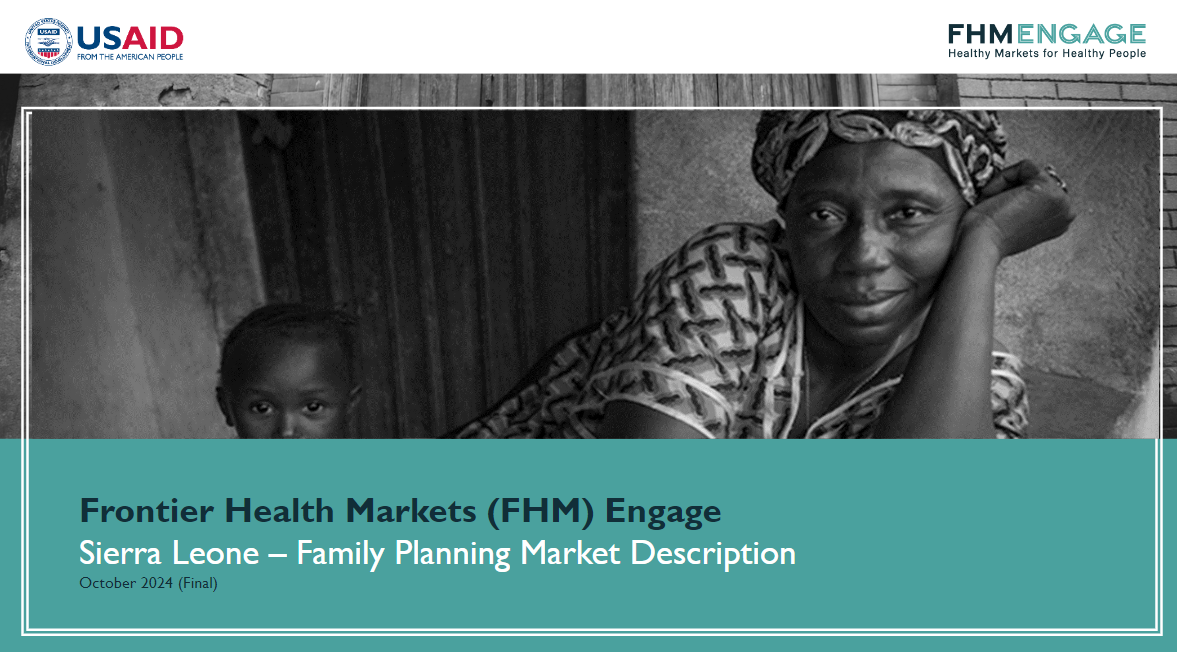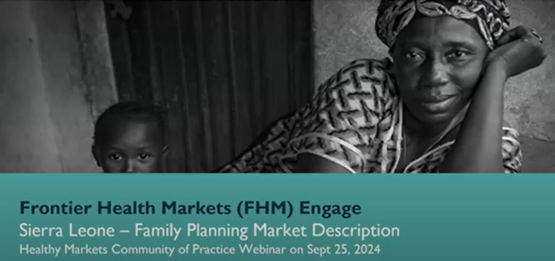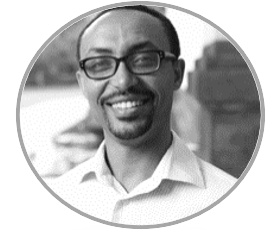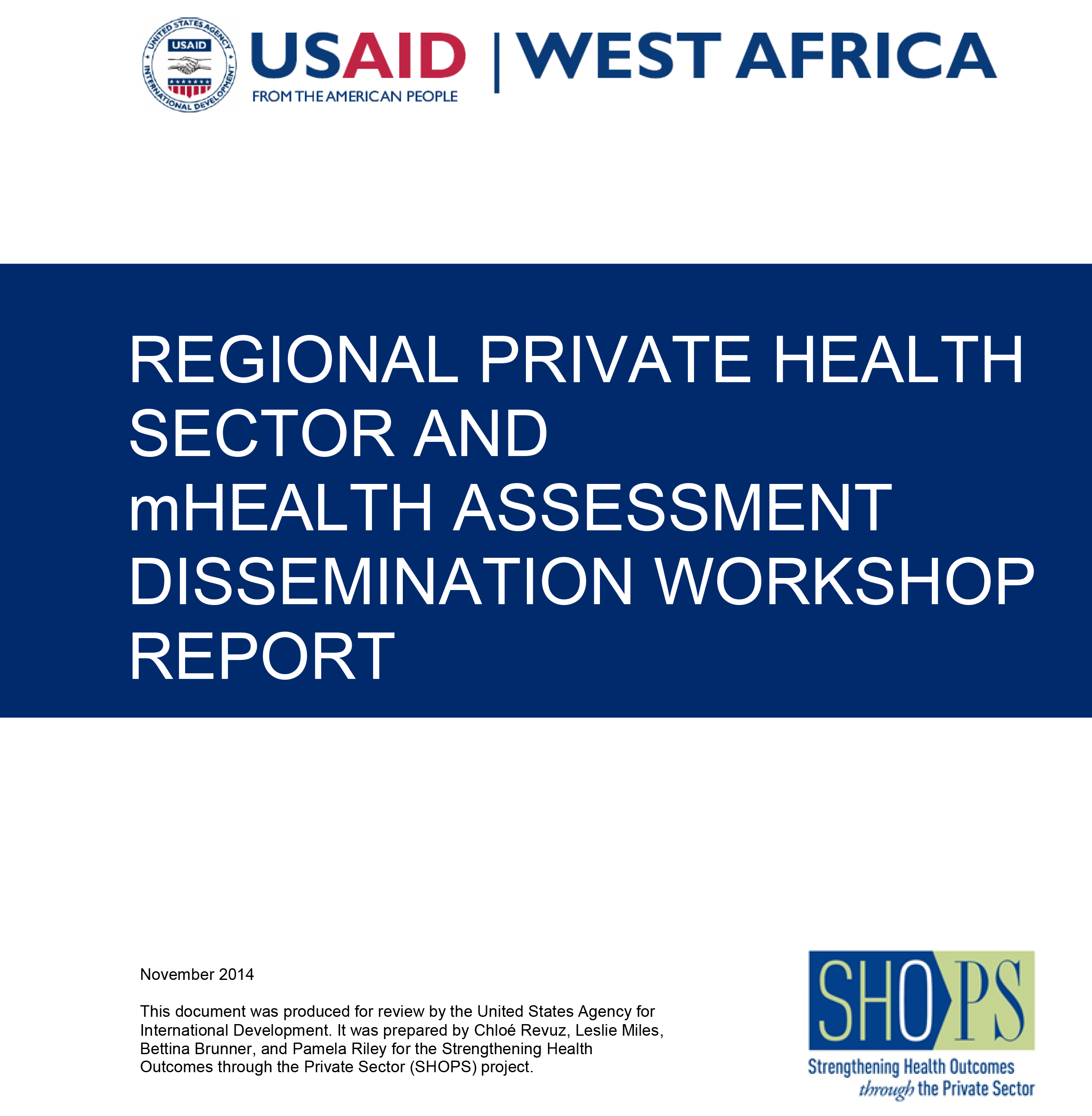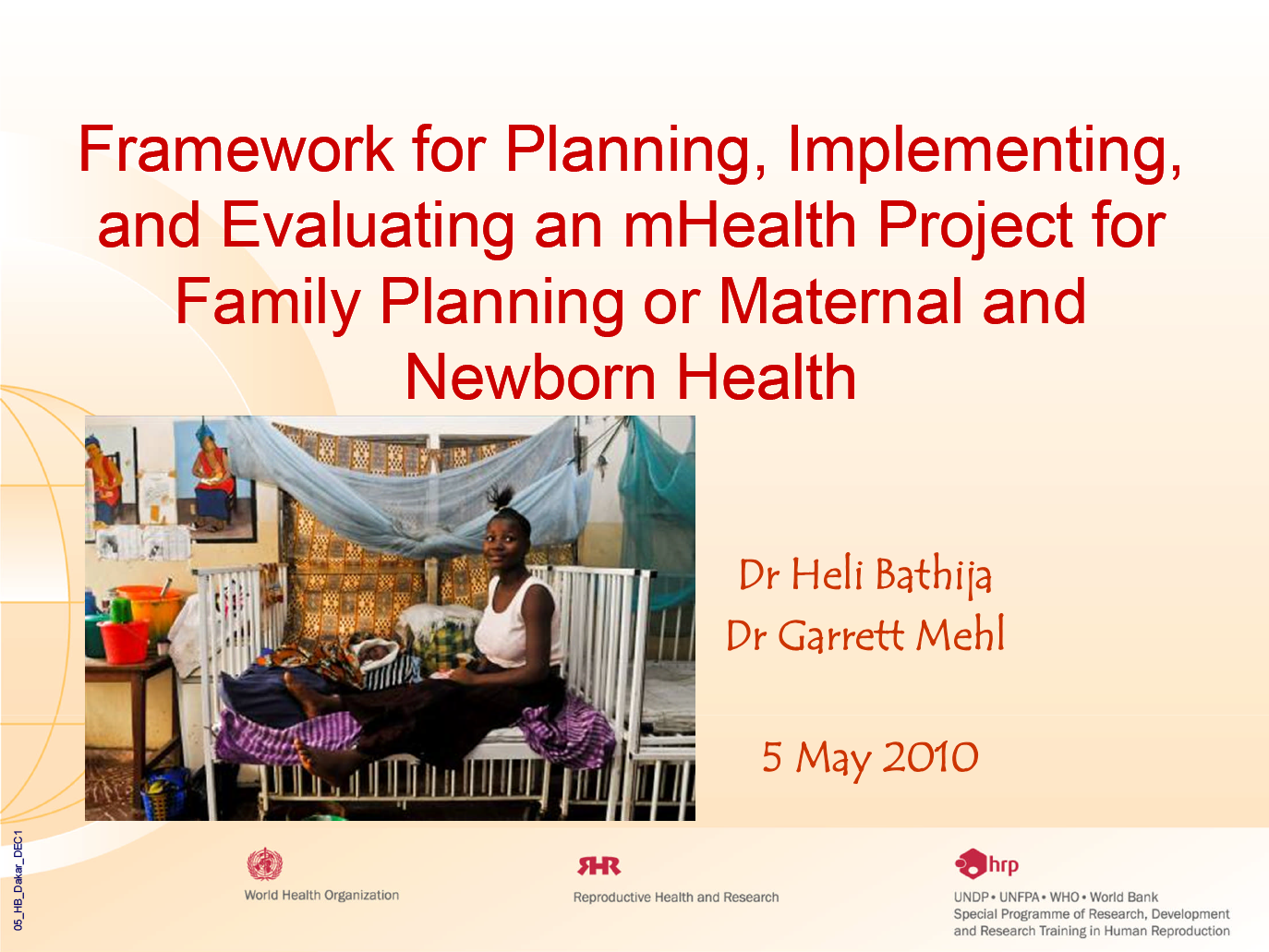
Resource Library
Sierra Leone Market Description 2024
Resource Type : Presentation
Country : Sierra Leone
Year : 2024-10-23T10:34:11
Language : English
Project : FHM Engage
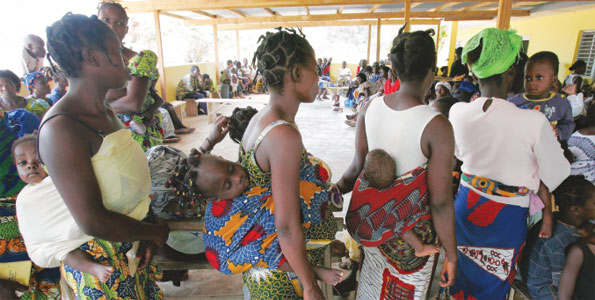
Healthy Markets CoP Session - Sierra Leone - September 2024
The September session of the Healthy Markets Community of Practice focused on the family planning (FP) and sexual reproductive health SRH) market in Sierra Leone. The session included presentations from FHM Engage, Planned Parenthood Association of Sierra Leone, DKT, People's Alliance for Reproductive Health (PARHA), Health Alert Sierra Leone, UNFPA Sierra Leone, MOMEMTUM Country & Global Leadership (MCGL), and Marie Stopes Sierra Leone.
Shankar Narayanan, Senior Technical Advisor for Market Development, FHM Engage, provided an overview of FHM Engage’s recent findings from the Sierra Leone FP Market Description.
We want to thank the team at PARHA for all organizing this meeting and USAID Development Assistance Specialist, Health, Aiah Lebbie Sosokoeneh, for his participation.
We extend our gratitude to everyone who participated in this session, with special appreciation for those who dedicated their time to present.
Due to the great amount of interest from speakers in Sierra Leone, we were not able to feature speakers from the Pharmaceutical Society of Sierra Leone and the Sierra Leone Midwives Association, organizations that we will invite to speak at future thematic sessions. Additionally, we would like to acknowledge the technical difficulties experienced with using a new technology platform. We have switched platforms for the upcoming session on Malawi, removing some controls and increasing ease of use for participants.
The Sierra Leone meeting featured the following speakers:

| Shankar Narayanan, Senior Market Development Advisor FHM Engage, Family Planning Market Description The Market Description for Sierra Leone estimates that there is a large contraceptive use/need gap with adolescents (15-24) accounting for nearly a third of the overall use/need gap. The private sector has a low density of health services concentrated in Freetown, and FP commodities are all imported. To address this gap the market description recommends prioritizing adolescents and youth by aligning supply with adolescent and youth needs, understanding demand side barriers and addressing non-use of modern method, and enhancing financing support for private sector involvement in family planning. |
| Gladys Goba, Regional and Ag. Service Delivery Manager for Planned Parenthood Association of Sierra Leone (PPASL) PPASL is currently operating in 8 out of the 16 Districts in Sierra Leone and is currently implementing projects supported by IPPF, Save the Children, and UNFPA. Key interventions are centered around service delivery, advocacy, and demand creation/awareness raising. As a part of their work, PPASL trains social media influencers on SRH&R issues and worked with the government to develop materials for a pilot program in several school districts. |

| Phildys Johnson, Manager- Programs and Regulatory Affairs for DKT DKT was established in Sierra Leone in 2018 and focuses on social marketing, demand generation, and capacity building. DKT is present in every district in the country and distributes commodities to over 2000 pharmacies, drugstores and non-traditional outlets across the country. DKT also operates free mobile outreach for family planning done across the country. Some of DKT's future activities include youth targeted family planning activations in slums and student communities to reduce teenage pregnancies and launching Lydia Campus Clubs in universities and vocational centers. |
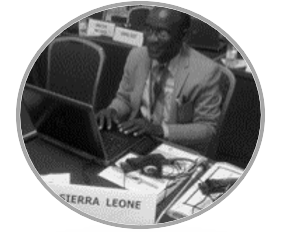
|
Fodie Kamara, Chairman/Executive Director for People’s Alliance for Reproductive Health Advocacy (PARHA) PARHA is a Coalition of Sexual and Reproductive Health Rights advocates and constitutes over 70 NGOs, CSOs, faith leaders, and CBOs. The work of PARHA is focused on five key areas that include research, advocacy, training, collaborative partnerships, and empowerment. An important part of PARHA's work is establishing successful collaborations. Currently PARHA is leading stakeholders engagements on the Safe Motherhood & Reproductive Healthcare (SMRH) Bill 2024. PARHA is also the lead consortium partner on the FHM Engage activity focusing on stewardship for youth driven demand for FP in Sierra Leone. |
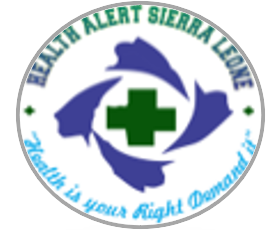
| Darlton John, Program Manager for Health Alert Sierra Leone (HASiL) HASiL is a local civil society organization specialized in health development advocacy and accountability programming in Sierra Leone. HASil with the Private Sector Health Federation is piloting what it calls the Motion Tracker, which works to ensure better monitoring of FP2030 commitments. The Motion Tracker and other tools help ensure that commitments from both public and private sectors are tracked, leading to better service delivery and contraceptive access and ensuring accountability in family planning efforts. HASil also works to engage private health groups, businesses, and the Company Federation in supporting FP services. |
| Gamachis Shogo, Technical Specialist - RHCS for UNFPA Sierra Leone Mr. Shogo provided more insight into the FP landscape in Sierra Leone noting that the private sector serves 18 percent of FP users in the country. Through the UNFPA Supplies Partnership, UNFPA delivers a choice of modern contraceptives and life-saving maternal health medicines and has provided $13.8 million in contraceptive supplies from 2019 to 2023 and $1.8 million for health systems strengthening from 2019 to 2023. The Government of Sierra Leone and UNFPA have signed a Supplies Partnership Compact to gradually increase domestic financing for reproductive health supplies. |

| Baindu Kosia, Country Director Jhpiego for MOMENTUM Country & Global Leadership USAID MOMENTUM uses a local partnership approach to work with organizations like the Sierra Leone Midwives Association, FOCUS 1000, Health Alert, and the Christian Health Association of Sierra Leone. Interventions target and work across national, district, and facility levels. MOMENTUM is also focused on youth led innovation and current activities include the Annual National Adolescent and Youth Family Planning Conference, the hackathon challenge that looks for innovative to increase FP information and service to youth and adolescents, and Winner FP Youth Connect where youth use tricycles (KEKE) to deliver FP/RH information and services across districts. |
 | Edward Joseph Benya, Program Operations Director for Marie Stopes Sierra Leone (MSSL) Since 1989 MSSL has operated as a local NGO in Sierra Leone and has a nationwide network that supports the Government’s efforts to strengthen the healthcare system across the country. MSSL is present in all districts in the country and offers a range of services including FP, contraception, maternal health, and sexual health education. MSSL is the leading family planning provider in the country offering more than 40 percent of the total family planning provided. MSSL operates in 13 mobile outreach clinics across the 15 provincial districts providing services for women and girls in hard-to-reach communities including implant insertion and removal, IUD insertion and removal, and three three-month injectables. |
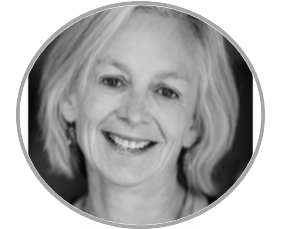
| Andrea Bare, Senior Technical Advisor, USAID PRH Concluding Remarks |
Resources
If you have resources you would like featured in the newsletter or any upcoming event that would be of interest to the HMCoP please contact FHM-HMCoP@fhm-engage.org.
Future Meetings and More
Coming Up:
December- Pharmacy & Drug Shops
More Information
On the USAID Health Market Links website, managed by FHM Engage, you can find past session recordings, slide decks, or revisit past newsletters. See the HMCoP page here: Healthy Markets CoP | FHM Engage (healthmarketlinks.org). If you have questions or would like to make us aware of an organization or project to feature, please email FHM-HMCoP@FHM-Engage.org or Farhan Yusuf (fyusuf@r4d.org).
Banner image: Women stand in line at a health facility in Sierra Leone. Source: PRESS RELEASE : Investing in family planning is key to saving women’s lives in Sierra Leone – Cocorioko.
Recent Highlights
-
Written by :
-
Published on : 10-Oct-24
- Highlight Type : Event
- Country :
- Project : FHM Engage
- Language : English

Resource Library
Sierra Leone ORS Case Study
From 1991-2002 Sierra Leone was home to an 11-year civil war that decimated the infrastructure countrywide. Over half the population was displaced from their homes and were the victims of torture and trauma. After being without a health sector strategic plan for a decade, Sierra Leone is still in the process of rehabilitating the health system and has been heavily supported by international donors. This case study examines the high rate of ORS use in Sierra Leone compared to other African countries as a result of this heavy support from international donors. The success in scaling up ORS coverage through the process of the rebuilding the health system following the conflict can be contributed to many factors: mothers were exposed to an effective marketing campaign in IDP camps which showed that ORS could treat dehydration, ORS was nicely packaged and widely available to the population in health centers, and there was ample funding from donors for procurement and distribution of the product.
Resource Type : Brief
Country :
Year : 2012-11-01T00:00:00
Language :
Project : SHOPS

Resource Library
Regional Private Health Sector and mHealth Assessment Dissemination Workshop Report
On May 20–21, 2014, West African public and private health sector stakeholders gathered in Accra, Ghana to discuss findings and recommendations of the SHOPS project’s reports, “The Private Health Sector in West Africa: Six Macro-Level Assessments” and “mHealth in West Africa: A Landscape Report.” Seventy-three participants, including representatives from 11 West African governments, mhealth developers, mobile operators, international donor organizations, and implementing partners used the event as an opportunity to share knowledge, build relationships, and explore partnership opportunities in the region. The workshop served as the first forum for stakeholders in West Africa to explore opportunities for mhealth and the private health sector in the region.
Resource Type : Report
Country :
Year : 2014-11-13T00:00:00
Language : English
Project : SHOPS

Resource Library
Tanzania Zinc Case Study
This document is part of a series of fourteen case studies in eleven countries that have tried to scale up ORS and zinc. These case studies document both successful and unsuccesful programs and contribute to our understanding of efforts to deliver proven interventions for childhood diarrhea. They are relevant to the community of international agencies, policy makers, researchers, and donors. Countries included in the series are: Bangladesh, Guyana, India, Jordan, Madagascar, Malawi, Nepal, Senegal, Sierra Leone, Tanzania, and Trinidad and Tobago. In some cases a country may have two case studies, one on ORS and one on zinc.
Resource Type :
Country : Tanzania
Year : 2013-01-09T00:00:00
Language : English
Project : SHOPS

Resource Library
Framework for Planning, Implementing, and Evaluating an mHealth Project for Family Planning or Maternal and Newborn Health
A narrated presentation contributed by Heli Bathija of WHO Switzerland from the SHOPS mHealth eConference held on May 5, 2010. To view the narrated presentation from the mHealth eConference, please visit: http://icohere-presentations.com/presentations/SHOPS2010/hBathija/player.html
Resource Type : Presentation
Country :
Year : 2010-05-01T00:00:00
Language : English
Project : SHOPS


